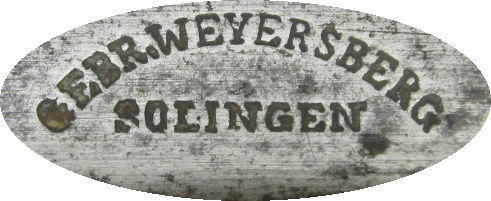Gebr. Weyersberg, Solingen

The Gebrüder Weyersberg company has a famous, long and entangled history, in many later formed companies and amalgamations, throughout Germany and the world. Most notably, within this concentration, is its merger into the WKC-Waffenfabrik G.m.b.H. company, which occurred in 1930.
The Gebr. Weyersberg, Waffenfabrik, company began on January 1, 1787, with the two brothers: Johann and Peter Weyersberg. Both sons of Peter Weyersberg, who came from a blood line of five previous generations of blade merchants and swordsmiths. This allowed the company to claims its history back to 1573 with their ancestor Wilhelm Weyersberg, the then, mayor of Solingen. The famous king's head (Königskopf) trademark was registered by Peter on May 3, 1777, yet had been used by the family well before that time. A permanent blade warehouse was established in Frankfurt am Main in 1788.
In 1820, Karl Reinhard Berg, Peter Weyersberg's son-in-law, entered the business. Berg and his descendants played an increasingly important role in the future of the company. Peter, the longest surviving brother, passed away in 1829 and control transferred to Albert Weyersberg and Fritz Berg, son and grandson-in-law of Karl, and then to Albert's sons Hermann and Fritz. The Berg family, essentially merchants, concentrated on expanding the trading activities, while the Weyersbergs, the craftsmen, oversaw production. The first factory was built in 1850, next to the house in Kolnerstrasse, but in 1859, production moved to a new factory in Hochstrasse. Gebr. Weyersberg registered with the Solingen chamber of commerce on April 10, 1862. Fritz Weyersberg visited Sheffield, England in 1873, where he saw a blade-rolling machine patented ten years prior by William Barnes. Gebr. Weyersberg obtained a license to operate the blade-roller in Solingen, where it proved to be the breakthrough that enabled the firm not only to mass-produce side-arms but also ultimately dominate the market. Gebr. Weyersberg products were widely sold and used in: Prussia, Baden and Württemberg. Weyersberg also exported arms to: Great Britain, Switzerland, France, Russia, Denmark, China and other countries. On January 6, 1882, Gebr. Weyersberg received German Reichspatent no. 18823 for the Feder-Einrichtung an Infanterie-Seitengewehr (spring device for infantry bayonet), to protect a press-catch operated by an internal coiled spring; this was almost immediately used on the S. 71/84 bayonet.
The unexpectedly sudden death of Hermann Weyersberg in 1883 brought an unexpected management crisis which was solved by amalgamating Gebr. Weyersberg with the W.R. Kirschbaum & Co. company to form "Weyersberg, Kirschbaum & Co.". As part of the agreement, the well-established trading department of Weyersberg was reconstituted under the management of the Berg family and operations continued under the "Gebr. Weyersberg" name who used trademarks including the: Cornet and Horse Head (under the Solinger Axt- u Hauerfabrik company). In 1922, Weyersberg, Kirschbaum & Co. was taken over by "Siegen-Solinger Gußstahlverein", yet it eventually went down at the start of the Great Depression. In 1930, Weyersberg, Kirschbaum & Co. closed and allowed for new ownership and re-organization to create the WKC-Waffenfabrik G.m.b.H. company.
| Maker | Gebr. Weyersberg |
| Location | Solingen |
| RZM Number | N/A |
| Trademark | Kings Head | Cornet |
| Founded | 1573 |
Looking to sell your dagger or sword? We are always buying. Please, Contact us we would be happy to assist you.



